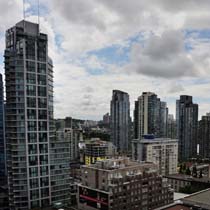Vacancy rate lowest in Canada with market that’s going to get tighter
Wendy McLellan
Province

Vancouver’s short supply of downtown office space means companies have to make longer-range plans if they want to expand. Jon Murray file photo – The Province
Downtown office space is easier to rent in Tokyo than Vancouver.
It’s also easier to find vacant office space in 84 other big cities in the world, according to a new real-estate report showing downtown Vancouver has the twelfth tightest office-vacancy rate in the the world.
At 2.3 per cent, the city has the lowest downtown office-vacancy rate in Canada. Toronto has the second-tightest downtown office space with a 3.8-per-cent vacancy rate. Among big U.S. cities, Boston has the lowest rate at 6.6 per cent.
space in Vancouver, they will have trouble finding options,” said Pierre Bergevin, president and CEO of global real-estate firm Cushman and Wakefield LePage.
“There is clearly not enough supply to meet demand.”
The company released the report on office-vacancy rates in the core areas of 97 cities worldwide, based on first-quarter statistics.
Vancouver‘s short supply of desirable downtown office space means companies have to make longer-range plans if they want to expand, Bergevin said.
“Anybody who has space and needs to do something about it in the next three to five years will have to start looking now,” he said. “This is a challenge for businesses that are expanding — they don’t have a lot of options right now.”
Tony Astles, executive vice-president of Bentall Real Estate Services, said a normal vacancy rate would be in the range of five to nine per cent. Rents for prime office space have been rising for more than two years and hit an all-time high late last year.
“What most people haven’t come to grips with is that even at this level, the rents aren’t enough to induce new building construction. Construction costs are still higher,” Astles said.
Residential towers are more profitable, and since building a new office tower takes about five years, developers are reluctant to take a risk on an uncertain future market.
Instead, they are turning to the suburbs and building lower-rise office buildings on cheaper land near public transit.
“If tenants can’t grow in Vancouver, they will move to other areas to achieve that growth, and that is already beginning,” Astles said.
“They are moving to more suburban areas of Vancouver, Burnaby, Richmond because there’s no room.”
Currently, there are no new office buildings under construction in the downtown core and only a couple projects in the discussion stage at city hall, Astles said.
“If it was economically viable to build office buildings, they would be built,” he said. “In the next five years, there will be few new buildings constructed and that means an even tighter market.”
© The Vancouver Province 2008

